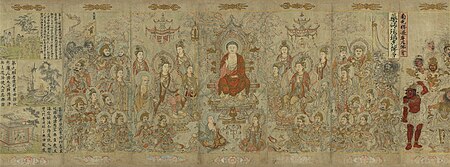Our website is made possible by displaying online advertisements to our visitors.
Please consider supporting us by disabling your ad blocker.
Society of the Song dynasty

Chinese society during the Song dynasty (AD 960–1279) was marked by political and legal reforms, a philosophical revival of Confucianism, and the development of cities beyond administrative purposes into centers of trade, industry, and maritime commerce. The inhabitants of rural areas were mostly farmers, although some were also hunters, fishers, or government employees working in mines or the salt marshes. Conversely, shopkeepers, artisans, city guards, entertainers, laborers, and wealthy merchants lived in the county and provincial centers along with the Chinese gentry—a small, elite community of educated scholars and scholar-officials. As landholders and drafted government officials, the gentry considered themselves the leading members of society; gaining their cooperation and employment was essential for the county or provincial bureaucrat overburdened with official duties. In many ways, scholar-officials of the Song period differed from the more aristocratic scholar-officials of the Tang dynasty (618–907). Civil service examinations became the primary means of appointment to an official post as competitors vying for official degrees dramatically increased. Frequent disagreements amongst ministers of state on ideological and policy issues led to political strife and the rise of political factions. This undermined the marriage strategies of the professional elite, which broke apart as a social group and gave way to a multitude of families that provided sons for civil service.
Confucian or Legalist scholars in ancient China—perhaps as far back as the late Zhou dynasty (c. 1046–256 BC)—categorized all socioeconomic groups into four broad and hierarchical occupations (in descending order): the shi (scholars, or gentry), the nong (peasant farmers), the gong (artisans and craftsmen), and the shang (merchants).[1] Wealthy landholders and officials possessed the resources to better prepare their sons for the civil service examinations, yet they were often rivaled in their power and wealth by merchants of the Song period. Merchants frequently colluded commercially and politically with officials, despite the fact that scholar-officials looked down on mercantile vocations as less respectable pursuits than farming or craftsmanship. The military also provided a means for advancement in Song society for those who became officers, even though soldiers were not highly respected members of society. Although certain domestic and familial duties were expected of women in Song society, they nonetheless enjoyed a wide range of social and legal rights in an otherwise patriarchal society. Women's improved rights to property came gradually with the increasing value of dowries offered by brides' families.
Daoism and Buddhism were the dominant religions of China in the Song era, the latter deeply affecting many beliefs and principles of Neo-Confucianism throughout the dynasty. However, Buddhism came under heavy criticism by staunch Confucian advocates. Older beliefs in ancient Chinese mythology, folk religion, and ancestor worship also played a large part in daily life, with widespread belief in deities and ghosts of the spiritual realm acting among the living.
The Song justice system was maintained by sheriffs, investigators, and official coroners, and headed by exam-drafted officials acting as county magistrates. Song magistrates were encouraged to apply practical knowledge as well as written law in making judicial decisions to promote social morality. Advances in early forensic science, a growing emphasis on gathering evidence, and careful recording by clerks of autopsy reports and witness testimony aided authorities in convicting criminals.
- ^ Fairbank, 108.
Previous Page Next Page


